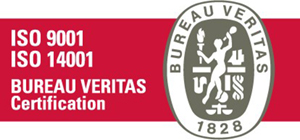Quality and supplier portal
Demands on companies are constantly growing. Becoming certified and introducing environmental and quality systems, companies ensure that things are done right by documenting existing working procedures and developing new suggestions for improvement from these.
Certification is an ongoing process, with lots of audits which ensure that companies are remaining within set boundaries. This is a major undertaking, but one which involves many positive aspects;
- Greater credibility
- Facilitation of market access
- Simpler marketing communications
- Greater efficiency
- A stronger brand
Quality
As of today, engcon AB, engcon Nordic, engcon Sweden, engcon Poland, AB Mähler & Söner and Engcon Shared Service Center are all quality certified in accordance with ISO 9001:2015. ISO 9000 is the group of standards and guidelines which forms the most accepted quality system in the world.

ISO 9001:2015 is a new version of the internationally renowned standard for quality systems. This standard allows quality issues to be measured, monitored and checked. This benefits customers in the long run, which is of course what the program is meant to do. Moreover, good quality initiatives make work and information exchange within the company more seamless and efficient. Nowadays ISO 9001 is a competitive tool which no company of the future can ignore.
To be certified to the ISO 9001 standard, a company must demonstrate that it has a well thought out business system which is also documented in accordance with the standard and consistent with what actually happens. engcon was certified by Bureau Veritas Certification, and in order to retain this certificate, randomly selected parts of the company are audited at regular reviews.
Environmental impact
engcon AB, engcon Nordic, engcon Sweden, engcon Poland, AB Mähler & Söner and Engcon Shared Service Center are environmentally certified in accordance with ISO 14001:2015. engcon's renders its business eco-friendly through the company's awareness of environmental conditions. The company's ambition to achieve development that is sustainable in the long term is based on continuous improvement initiatives, staff awareness of environmental problems and consideration for the environment when decisions are made.
Based on the Plan-Do-Check-Act cycle, ISO 14001 specifies the most important requirements for identifying, checking, systematising and monitoring environmental impact within organisations, and also how the system is managed and improved.
Environmental regulations
REACH regulation
The reach regulation deals with the registration, evaluation, authorisation and restriction of chemical substances. Reach also includes standards for users of chemicals, which has not been the case in previous legislation.
https://echa.europa.eu/regulations/reach/understanding-reach
Electrical and electronic equipment - RoHS
The RoHS Directive aims to reduce risks to human health and the environment by replacing and restricting hazardous chemical substances in electrical and electronic equipment. The directive will also improve opportunities for the profitable and sustainable recycling of waste from electrical and electronic equipment. RoHS stands for Restriction of the use of certain Hazardous Substances in electrical and electronic equipment.
https://ec.europa.eu/environment/topics/waste-and-recycling/rohs-directive_en
On the notification of substances in articles to the SCIP database
When goods become waste, the presence of hazardous substances may make the waste unsuitable for recycling. The EU has a goal of non-toxic materials cycles. To further this goal, the European Chemicals Agency (ECHA) has created the SCIP database where suppliers of articles are required to notify the presence of particularly hazardous substances in the articles. This information is then made available throughout the life cycle of the articles, including at the waste stage. The regulation forms part of the Waste Directive 2008/98/EC. It came into force on 05 January 2021.
Documents
404 - Page not found
We couldn't find the page you're looking for.
An error has occurred
Try downloading the page again to see if the error recurs.
An error has occurred
We could not connect you to the Internet